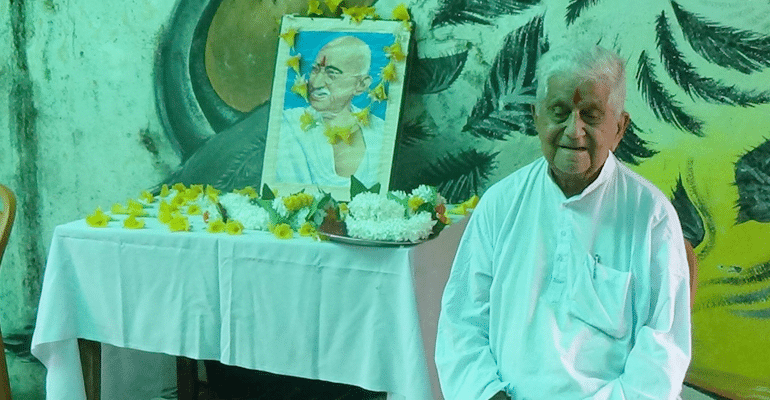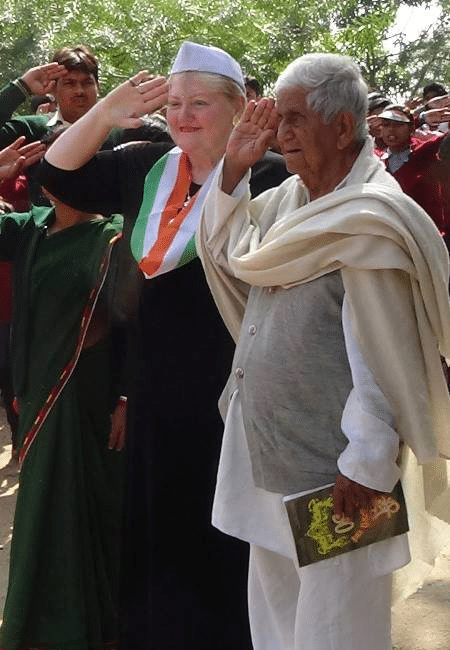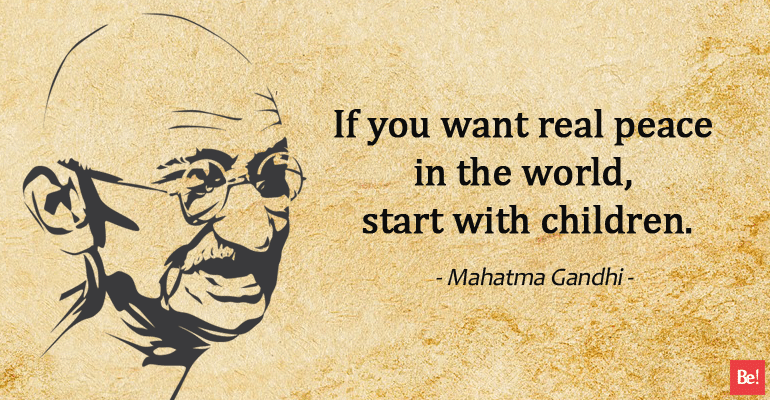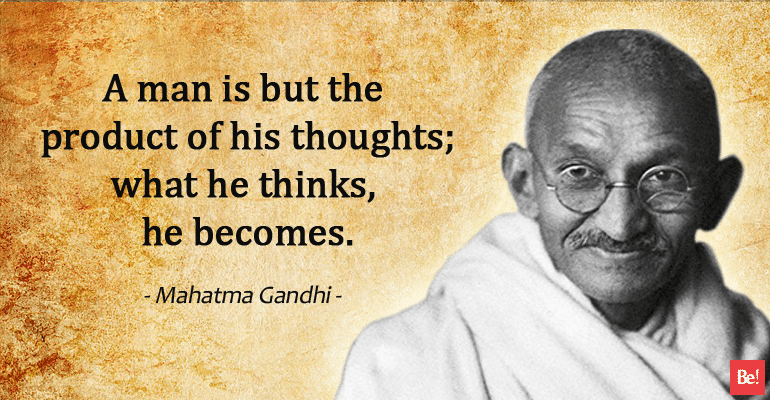His belief in ‘truth’ and ‘non-violence’ changed the course of history for India. And the nation today, on the 2nd of October 2018, celebrates the 150th birth anniversary of Mohandas Karamchand Gandhi with love and gratitude. Today, even 70 years after his death, his teachings are still relevant and are the cornerstone of a great nation.
Even though you can now hear the heartbeat of the father of the nation in Delhi’s National Gandhi Museum, there is no way, you can overlook this man who is a living example of his teacher- GANDHI, in a time when the whole world is busy speaking of – Love, Compassion, Acceptance, and Forgiveness but failing to implement them.
In a heart-warming conversation with Life Beyond Numbers, the last active disciple of Mahatma Gandhi, Dwarko Sundrani says, “The universe is my family and you should question yourself whether you want to be limitless or limited while spreading love”

A die-hard mango lover, Sundrani was born in the Larkana district of Sindh (now in Pakistan). His father was a landlord and used to have a mango garden, so while growing up he became fond of the fruit. His friends included some of the finest humans- Rev. Martin Luther King, E.F. Schumacher, Osho, and his holiness the Dalai Lama. Some of them have also visited his ashram in Bodh Gaya.
Gandhi’s Last Active Disciple
You will definitely wonder if we tell you the last active disciple of Gandhi did once burn a post office for protest. “I was young back then when this happened.” Dwarko believes that this was a victory for him as he got a glimpse of the violent tendencies of the mind and decided to change it opting non-violent ideas of Gandhi. “An eye for an eye, over time, will leave the whole world blind.”
After his matriculation, Dwarko wanted to meet Gandhiji in person as he was so intrigued by his ideas and principles. Influenced by Gandhian principles in his 20s, he decided to live his life not by reading about Gandhi’s ideas but by living it. It was after his matriculation, he met Gandhi in Nagpur and since then he has devoted his life for the welfare of the people.
Dwarko Sundrani ji recalls that ‘when Jawaharlal Nehru was the Prime Minister of India, a journalist once asked Gandhi about his opinion on British rule. He said, “I love British people but I hate British Rule. Nehru loves British rule and hates British people.” This was his idea of life, he never hated people.’
Once at a conference in 2004, Dwarko ji was asked, “Gandhi faced the cultured British rule but do you think he could’ve handled Hitler?” “It would’ve been easier for Gandhi to handle him, actually,” he replied. “Just as you can’t see the lights in the evening but can see them brightly in the total darkness, the message of nonviolence would’ve easily worked in the total darkness of Hitler’s Germany.”

He says there are infinite instances that bear proof that Gandhi practiced what he preached. When he was called to give a speech for half an hour in a school, Gandhiji asked where is the toilet and did not come out for half an hour. When the staffs of the school grew curious and checked on him, he came out and said, “I was wondering why the toilets of a school are so dirty and therefore I have cleaned all four of them. My half an hour is complete as I have promised” and he left without another word.
The problem with today’s world is everyone is “Knowledge Obese”. “If you have a car but you don’t know how to drive it, how will you reach your destination? We have too much information, but we fail to use them,” says Sundrani.
Getting impregnated by knowledge does one no good but using it to create a positive shift in the society can make a lot of difference. It is only when we change, the world around us changes. Therefore, Gandhi always urged people to look within.
Growing close to Vinoba Bhave
After partition, Sundrani moved to Mumbai where he met Vinoba Bhave, who was the spiritual successor of Gandhi.
“I wrote a letter to Bhave and expressed my desire to work for him as he was helping needy people. On visiting Bhave, he asked me how can I understand the pain of common people if I have never been to such situations? After giving it a thought, I went back. But he wrote to me and urged me to come back and join him,” he says.

As years passed, Dwarko emerged as Vinoba’s favorite at the Brahma Vidya Mandir in Pavana village where both of them worked for Kanchana Mukti (liberation from money). It was in 1953 when Vinoba asked Dwarko to join him at Bodh Gaya where an ashram named Samanvayawas was set up, which started functioning a year later on April 18, 1954.
Einstein once said that “Science without religion is lame, religion without science is blind” and Bhave believed in this idea with all his heart. Therefore, the objective of his ashram was to motivate people to shun politics and religion and embrace science and spirituality. It was thus, named Samanvaya, a harmony of science and spirituality.
Education makes you complete
“Education is not about competing with others, it is about interconnectedness and that is what Gurukuls in India used to teach before the British system of education was brought to India,” says Dwarko.
Adding to this he says, “once Queen Elizabeth asked Lord Macauley what needs to be done to destroy India from within. To which Macaulay said, we need to rob India of its education system, replace it with ours and only then we can truly ruin it.”
On asking about the current education system in India, Dwarko says to LBN, “The modern education system doesn’t inculcate anything that is controlled or guided by the impulses of the heart. It is important to believe in children and trust them. Education and life are not correlated. The problem starts when we use education to train our mind and neglect our heart. Therefore, the world has always experienced a crisis because the mind and heart are never in harmony.”
In 1968, he opened a residential school in a 70-acre land accommodating 100 students. The then government of India took notice and helped him to open education centers in 350 villages, that covered 10,000 children. But, this project didn’t survive for long as the official concerned relinquished his post after a seven-year tenure.

This didn’t stop him from providing education to children and he soon opened 45 education centers called Jeevan Shiksha which covered 1,200 kids from the Musahar community (rat-eaters’ community) in Bihar. Further, he also introduced “Education Through Tree World” programme where children are asked to plant saplings and take care of them till they become full-grown trees and able to bear fruits of their hard work.
India’s Emotional Intelligence
Calling himself an ‘Instrument of Service’, Dwarko says, Gandhi always urged to look for freedom within ourselves. It is no wonder that his close friend, 14th Dalai Lama said to him, “Dwarko ji, I teach compassion but you live it.“
Citing one example from Vinoba’s life, he says, “When Vinoba was in class 7 and giving his exam, he found a man roaming in the hall and asked him what he wanted? The man said I am anxious to see if students cheat while giving their exams. Hearing this, Vinoba stood up and handed his notebook and said before leaving that there is no point in giving an exam if you can’t trust your students.”
He says, it is always what you believe in defines you and not what you wear or eat.
Dhirendra Sharma, who is closely associated with Sundrani and the founder of Bodhi Tree Educational Foundation says, “Dwarkoji gets so upset when he sees incidents of violence on women and the impact of war on children, that he doesn’t speak for days. To see what violence does to the mankind hurts him badly and shatters him.”
With a sense of grief, this 95-year old man who was once part of the Quit India Movement in 1942 says, “We live in a time when the world is ready to own Gandhi and the Indians are ready to disown him.”

